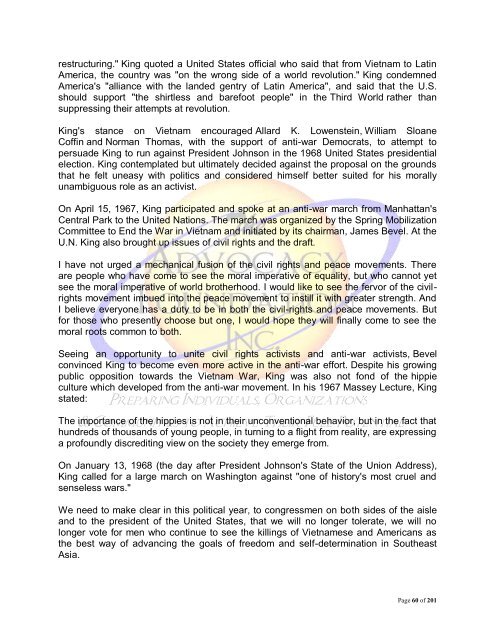You also want an ePaper? Increase the reach of your titles
YUMPU automatically turns print PDFs into web optimized ePapers that Google loves.
estructuring." King quoted a United States <strong>of</strong>ficial who said that from Vietnam to Latin<br />
America, the country was "on the wrong side <strong>of</strong> a world revolution." King condemned<br />
America's "alliance with the landed gentry <strong>of</strong> Latin America", and said that the U.S.<br />
should support "the shirtless and barefoot people" in the Third World rather than<br />
suppressing their attempts at revolution.<br />
King's stance on Vietnam encouraged Allard K. Lowenstein, William Sloane<br />
C<strong>of</strong>fin and Norman Thomas, with the support <strong>of</strong> anti-war Democrats, to attempt to<br />
persuade King to run against President Johnson in the 1968 United States presidential<br />
election. King contemplated but ultimately decided against the proposal on the grounds<br />
that he felt uneasy with politics and considered himself better suited for his morally<br />
unambiguous role as an activist.<br />
On April 15, 1967, King participated and spoke at an anti-war march from Manhattan's<br />
Central Park to the United Nations. <strong>The</strong> march was organized by the Spring Mobilization<br />
Committee to End the War in Vietnam and initiated by its chairman, James Bevel. At the<br />
U.N. King also brought up issues <strong>of</strong> civil rights and the draft.<br />
I have not urged a mechanical fusion <strong>of</strong> the civil rights and peace movements. <strong>The</strong>re<br />
are people who have come to see the moral imperative <strong>of</strong> equality, but who cannot yet<br />
see the moral imperative <strong>of</strong> world brotherhood. I would like to see the fervor <strong>of</strong> the civilrights<br />
movement imbued into the peace movement to instill it with greater strength. And<br />
I believe everyone has a duty to be in both the civil-rights and peace movements. But<br />
for those who presently choose but one, I would hope they will finally come to see the<br />
moral roots common to both.<br />
Seeing an opportunity to unite civil rights activists and anti-war activists, Bevel<br />
convinced King to become even more active in the anti-war effort. Despite his growing<br />
public opposition towards the Vietnam War, King was also not fond <strong>of</strong> the hippie<br />
culture which developed from the anti-war movement. In his 1967 Massey Lecture, King<br />
stated:<br />
<strong>The</strong> importance <strong>of</strong> the hippies is not in their unconventional behavior, but in the fact that<br />
hundreds <strong>of</strong> thousands <strong>of</strong> young people, in turning to a flight from reality, are expressing<br />
a pr<strong>of</strong>oundly discrediting view on the society they emerge from.<br />
On January 13, 1968 (the day after President Johnson's State <strong>of</strong> the Union Address),<br />
King called for a large march on Washington against "one <strong>of</strong> history's most cruel and<br />
senseless wars."<br />
We need to make clear in this political year, to congressmen on both sides <strong>of</strong> the aisle<br />
and to the president <strong>of</strong> the United States, that we will no longer tolerate, we will no<br />
longer vote for men who continue to see the killings <strong>of</strong> Vietnamese and Americans as<br />
the best way <strong>of</strong> advancing the goals <strong>of</strong> freedom and self-determination in Southeast<br />
Asia.<br />
Page 60 <strong>of</strong> 201

















